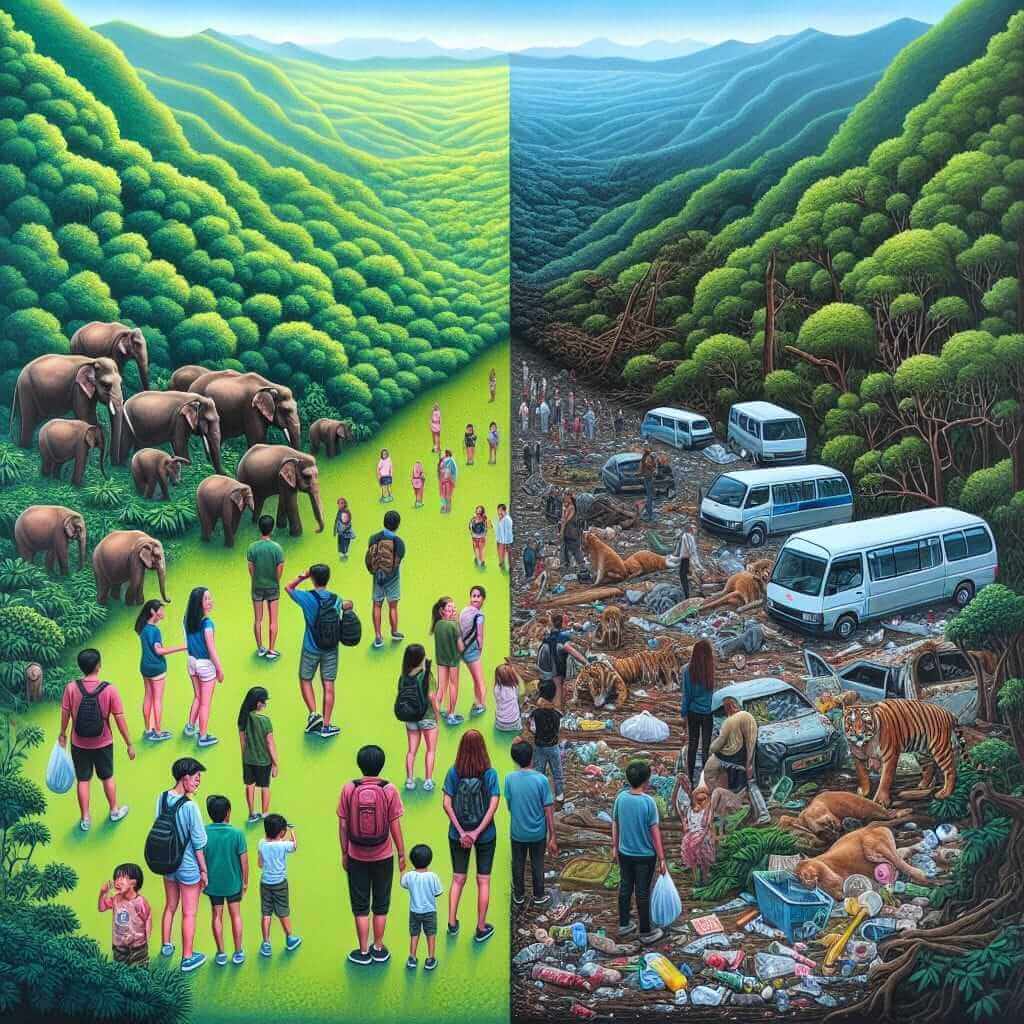The relationship between tourism and the environment is a frequent topic in IELTS Writing Task 2, especially given the increasing global focus on sustainability. This essay will explore the multifaceted impact of tourism on natural resources, providing a sample answer, vocabulary analysis, and essential tips to help you excel in your IELTS exam.
Here are some potential essay questions related to this topic:
- To what extent do you agree that tourism always damages the environment?
- Discuss the positive and negative effects of tourism on natural resources. Do the benefits outweigh the drawbacks?
- What measures can be taken to mitigate the negative impact of tourism on the environment?
Sample Essay: Tourism and Natural Resources
For this guide, let’s focus on the following question:
Discuss the positive and negative effects of tourism on natural resources. Do the benefits outweigh the drawbacks?
Essay Analysis
This question requires a balanced discussion of both the advantages and disadvantages of tourism’s impact on natural resources. It’s crucial to acknowledge both sides of the argument and provide supporting evidence for each point. The essay should conclude with a clear stance on whether the benefits outweigh the drawbacks.
Sample Essay:
Tourism, a booming global industry, has an undeniable impact on natural resources. While it can be a catalyst for economic growth and conservation efforts, it also presents significant challenges to the sustainability of our planet’s precious ecosystems.
One primary benefit of tourism is its potential to fund conservation initiatives. Revenue generated from park fees, tourism taxes, and visitor spending can be directly channeled into protecting endangered species, preserving natural habitats, and combating pollution. For example, ecotourism initiatives in Costa Rica have successfully contributed to the preservation of rainforests and the protection of diverse wildlife.
However, the influx of tourists can place a considerable strain on natural resources. Increased demand for water, energy, and food often leads to over-exploitation and depletion of these resources, particularly in water-scarce regions. Moreover, the carbon footprint associated with transportation, accommodation, and tourist activities contributes significantly to climate change, ultimately impacting ecosystems worldwide. The degradation of coral reefs due to pollution from sunscreen and irresponsible diving practices is a stark example of tourism’s potential for environmental damage.

In conclusion, while tourism can provide economic incentives for conservation and raise awareness about environmental issues, its potential for negative impacts on natural resources is undeniable. Overconsumption, pollution, and habitat degradation are serious consequences that cannot be ignored. Ultimately, the benefits of tourism can only outweigh the drawbacks if it is developed and managed sustainably, prioritizing the long-term health of our planet over short-term economic gains.
(Word count: 261)
Writing Tips:
- Structure: Follow a clear structure: Introduction, Body Paragraph 1 (Benefits), Body Paragraph 2 (Drawbacks), Conclusion.
- Examples: Support your points with relevant and specific examples.
- Vocabulary: Use a wide range of vocabulary related to tourism and the environment.
- Grammar: Pay attention to grammar accuracy, especially verb tenses and subject-verb agreement.
- Concision: Be concise and avoid redundancy.
Vocabulary:
- Catalyst (noun) /ˈkæt.əl.ɪst/: Something that causes a change or event to happen.
- Conservation (noun) /ˌkɒn.səˈveɪ.ʃən/: The protection of natural resources.
- Ecosystems (noun) /ˈiː.kəʊˌsɪs.təm/: A community of living organisms and their physical environment.
- Depletion (noun) /dɪˈpliː.ʃən/: The reduction in the number or quantity of something.
- Degradation (noun) /ˌdeɡ.rəˈdeɪ.ʃən/: The process of something becoming worse.
Conclusion
Mastering the art of writing about complex issues like the impact of tourism on natural resources is crucial for achieving a high band score in the IELTS exam. By understanding the nuances of the question, structuring your essay effectively, and utilizing topic-specific vocabulary, you’ll be well-equipped to express your ideas clearly and convincingly. Remember to practice regularly, analyze sample essays, and seek feedback to continuously improve your writing skills.